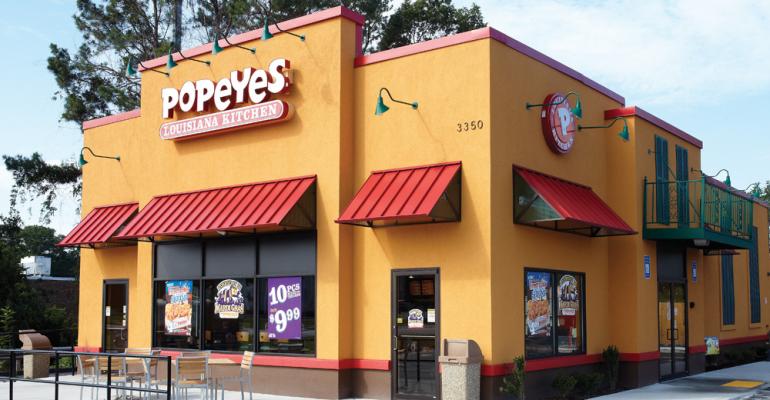Despite stay-at-home coronavirus orders broadly affecting U.S. restaurants in March, Popeyes Louisiana Kitchen posted same-store sales growth of 29.2% in the market during the first quarter, parent company Restaurant Brands International Inc. reported Friday.
Toronto-based RBI, which also owns the Burger King and Tim Hortons brands, said Popeyes’ bucked first-quarter industry trends on the strength of the chicken sandwich that was introduced last year.
“Popeyes' success last year wasn't like anything any of us have seen in our careers, but its resilience in the face of COVID-19, as dining rooms close across the country, was equally remarkable,” said José Cil, RBI CEO, in an earnings call Friday.
“Comparable sales growth was particularly strong in the U.S., rising nearly 30% for the quarter,” Cil said. “Performance in Popeyes varied substantially before and after the onset of COVID-19 in the U.S. but saw the least impact relative to our other brands.”
Systemwide, Popeyes’s same-store sales were up 26.2% in the quarter. In the last two weeks of March, the brand’s same store sales were flat on average, the company said, and daily sales comparisons at the end of April have returned to pre-coronavirus levels.
But with states and cities ordering many customers to shelter in place and work from home, RBI’s two brands with breakfast — Burger King and Tim Hortons — both posted negative systemwide same-store sales. Burger King was down 3.7% in the first quarter; Tim Hortons was down 10.3%.
Cil said RBI has modified operations at its brands to respond to the coronavirus pandemic, but the adjustments were marked at Popeyes.
“We've made many important adjustments at Popeyes since the global spread of COVID-19, rolling out contactless procedures in the drive-thru and putting additional resources behind delivery and mobile order and pickup,” Cil said. “In these channels, we've seen an increase in average order size and ticket, especially in the dinner day-part through communication of our family meal bundles.
“Comparable delivery sales are up in the triple digits year-over-year, and we continue to see delivery as a huge opportunity to reach new guests and in large the trade area of our stores as the brand builds on the momentum it has sustained from last year,” he said.
RBI has put emphasis on digital efforts at Popeyes as well as Burger King and Tim Hortons, Cil added.
Joshua Kobza, RBI’s chief operating officer, said COVID-19 accelerated customer behavioral changes already underway.
“Social distancing has forced consumers to quickly change their behavior and adopt solutions with a new threshold for convenience,” Kobza said. “For us, this has been a critical moment to leverage the infrastructure we've been building for years to move quickly to adapt our platforms in response to our guests' rapidly evolving needs,”
In the past two months, RBI has expanded delivery to 800 additional Tim Hortons in Canada. And delivery sales at Burger King and Popeyes tripled over the same period last year, Kobza said.
Kobza said RBI is dedicated to driving digital sales across its three brands.
“As of the third week of April, for our home markets, digital sales represented about 9% of total sales at Burger King, 15% of total sales at Popeyes and more than 30% of total sales at Tim Hortons,” he said. “We believe that our future growth prospects will be increasingly tied into our digital capabilities.”
While coronavirus outbreaks have been reported at meat-processing plants over the past week, RBI executives said they had not seen impacts on the supply chains for the three brands.
“We’re, obviously, working closely with the suppliers and our distribution partners as well to make sure we have all of our contingency plans in place,” Cil said.
For the first quarter ended March 31, RBI’s posted net income of $224 million, or 48 cents a share, compared to $246 million, or 53 cents a share, in the same period last year. Revenues were down 3.2% to $1.22 billion from $1.27 billion in the prior-year quarter.
As of March 31, Restaurant Brands had more than 27,000 restaurants in over 100 countries, including 18,848 Burger Kings, 3,336 Popeyes and 4,925 Tim Hortons.
For our most up-to-date coverage, visit the coronavirus homepage.
Learn how consumer trends are shifting during COVID-19 from our panel of experts on Thursday, May 7.
Contact Ron Ruggless at [email protected]
Follow him on Twitter: @RonRuggless


